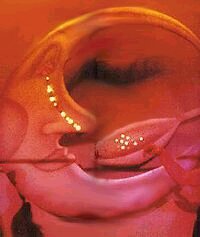Studio 54
Studio 54 was a world-renowned nightclub and discotheque located in Manhattan, New York City, which became a symbol of the 1970s and 1980s disco era. Known for its extravagant parties, celebrity guests, and strict entry policies, Studio 54 has left an indelible mark on the nightlife and culture of the era.
History[edit | edit source]
Studio 54 was opened on April 26, 1977, by Steve Rubell and Ian Schrager in the former CBS Studio 52. The club quickly became famous for its stylish and innovative decor, state-of-the-art lighting and sound systems, and the unique blend of people it attracted, from famous celebrities to regular party-goers. Studio 54 was known for its hedonistic atmosphere, where the normal social codes were challenged, and freedom of expression was celebrated.
Notable Aspects[edit | edit source]
One of the most distinctive features of Studio 54 was its door policy, managed by Rubell himself, who handpicked guests from the crowds outside, creating an atmosphere of exclusivity. The interior of the club was equally notable, featuring a dance floor beneath a suspended moon and spoon, which became iconic symbols of the club.
Celebrity Culture[edit | edit source]
Studio 54 became a hotspot for celebrities, including Andy Warhol, Liza Minnelli, Elizabeth Taylor, Mick Jagger, and many others. The presence of these celebrities contributed to the mystique and allure of the club, making it a central hub for the social elite of the time.
Legal Issues and Closure[edit | edit source]
Despite its popularity, Studio 54 faced legal issues, including charges of tax evasion, which led to the imprisonment of Rubell and Schrager. The club was sold in 1980 and went through several ownership and format changes before closing its doors in 1986. It briefly reopened under new management in the late 1980s and early 1990s.
Legacy[edit | edit source]
The legacy of Studio 54 extends beyond its physical location and time in operation. It has been featured in numerous documentaries, movies, and books, symbolizing the excess and glamour of the disco era. The club's influence can be seen in modern nightlife and culture, with many contemporary clubs drawing inspiration from its design and ethos.
See Also[edit | edit source]
| This article is a stub. You can help WikiMD by registering to expand it. |
Search WikiMD
Ad.Tired of being Overweight? Try W8MD's physician weight loss program.
Semaglutide (Ozempic / Wegovy and Tirzepatide (Mounjaro / Zepbound) available.
Advertise on WikiMD
|
WikiMD's Wellness Encyclopedia |
| Let Food Be Thy Medicine Medicine Thy Food - Hippocrates |
Translate this page: - East Asian
中文,
日本,
한국어,
South Asian
हिन्दी,
தமிழ்,
తెలుగు,
Urdu,
ಕನ್ನಡ,
Southeast Asian
Indonesian,
Vietnamese,
Thai,
မြန်မာဘာသာ,
বাংলা
European
español,
Deutsch,
français,
Greek,
português do Brasil,
polski,
română,
русский,
Nederlands,
norsk,
svenska,
suomi,
Italian
Middle Eastern & African
عربى,
Turkish,
Persian,
Hebrew,
Afrikaans,
isiZulu,
Kiswahili,
Other
Bulgarian,
Hungarian,
Czech,
Swedish,
മലയാളം,
मराठी,
ਪੰਜਾਬੀ,
ગુજરાતી,
Portuguese,
Ukrainian
Medical Disclaimer: WikiMD is not a substitute for professional medical advice. The information on WikiMD is provided as an information resource only, may be incorrect, outdated or misleading, and is not to be used or relied on for any diagnostic or treatment purposes. Please consult your health care provider before making any healthcare decisions or for guidance about a specific medical condition. WikiMD expressly disclaims responsibility, and shall have no liability, for any damages, loss, injury, or liability whatsoever suffered as a result of your reliance on the information contained in this site. By visiting this site you agree to the foregoing terms and conditions, which may from time to time be changed or supplemented by WikiMD. If you do not agree to the foregoing terms and conditions, you should not enter or use this site. See full disclaimer.
Credits:Most images are courtesy of Wikimedia commons, and templates, categories Wikipedia, licensed under CC BY SA or similar.
Contributors: Prab R. Tumpati, MD






